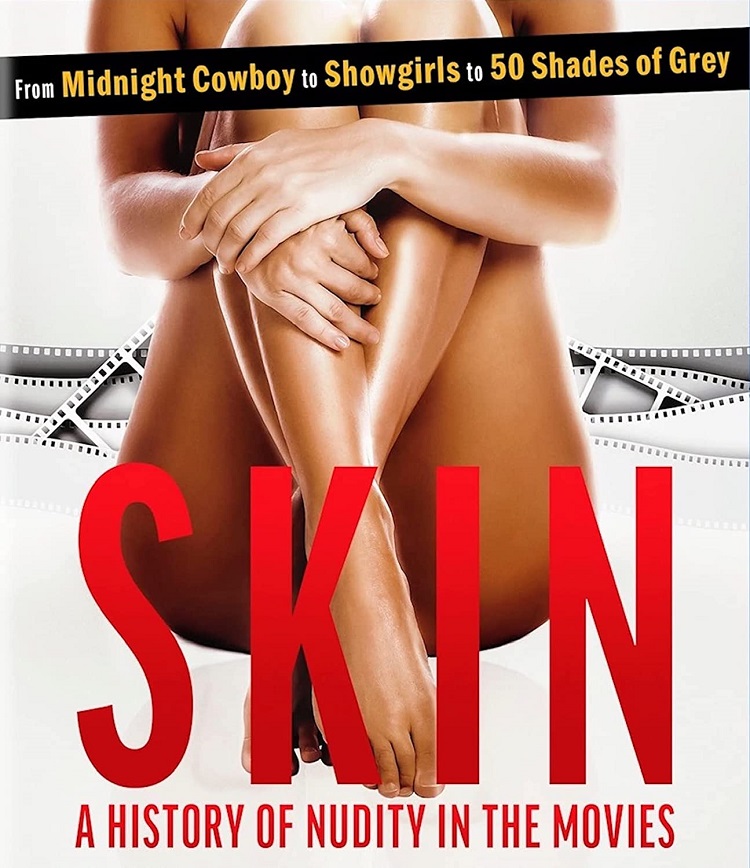
Skin: A History of Nudity in the Movies is the new documentary that chronicles the storied history of nudity in American film. Written and directed by Danny Wolf and co-written and executive produced by Paul Fishbein, this film takes the audience on a flesh-filled journey of naked people on film beginning with the invention of moving pictures and continues through to modern day. Skin chronicles how nudity has been used, challenged, exploited, and reimagined by filmmakers and actors. This new documentary also touches on the issues surrounding the Me Too movement, power dynamics, the exploitation of women, and body image issues.
This documentary is comprised of numerous famous and not-so-famous nude scenes alongside interviews with actors, directors, film and art historians, and other industry insiders. And while Skin can boast an impressive list of interviewees and content, the film is missing context and a clear vision. As a scholar of cultural history and a fan of film, I really wanted this documentary to be better than it was. It suffered from too much of an insider’s look and not enough of a critical eye.
The film begins with a short history lesson about the creation of motion pictures and Edison winning his patent over the Lumiere Brothers and then begins to move into pre- and post-Hays Code era films and the eventual creation of the MPAA rating board. In addition to these historical moments, the doc moves from decade to decade and highlights the important nude scenes that begin to change the game for the film industry accompanied by commentary from actors, directors, industry insiders, and film historians explaining why these scenes were such important cinematic moments. But while those moments are identified for each era, they are not placed within the larger context of culture or society to really make the audience understand why these nude scenes were so important. Film is a tool that is used to reflect or challenge the culture at large and without that context for each of these moments, it just felt like these nude scenes were really only changing the film industry and actually had no impact on society.
While I really enjoyed the attempt to use the interviewees to construct this historical and cultural timeline, it did not actually do that and at times just felt like a lot of standalone clips of professionals making claims about what they each felt was the game changer. I’m not sure if this lack of clear timeline is because of the questions that were asked during the interviews, the direction, or the editing, it’s difficult to tell. The larger important context just gets a little lost as different people just keep saying, “This is the thing that changed everything.”
Skin also has issues in its transitions between decades and important years. While I understand that this documentary covers a lot of ground over a long history, the continued use of a clapboard transition with oddly selected music and bad font made this film feel both dated and amateur.
While I am happy that the filmmakers did not want to create silences around the topics of the Me Too movement, female exploitation, and body image issues, these issues really only get a passing mention. To me, it felt like both Wolf and Fishbein wanted to make sure they showed the audience that they were taking these important issues into consideration, but they didn’t actually know how to address them in the film. While the doc both begins and ends with interview clips addressing these problematic elements in the entertainment industry, this film is definitely more about the nudity and less about the solutions that have and still need to come to remedy the harm. While including women, their experiences, and an intimacy coordinator is important, those appearances do not do enough in Skin. Like so many social and gender equality issues, people need to learn that when they don’t really know how to address large and complex issues that it is important to bring in people who do. The film could have been served by the inclusion of more folks outside the film industry who critically examine the cultural and historical aspects of not only the history of nudity in film but the problematic situations and institutions that it has created and upheld.
There are some things about this documentary that I really did enjoy. I think that the audience is presented with a wide breadth of films that they may never have considered before watching Skin. I also really enjoyed getting to hear from the actors and filmmakers who have been in and behind some of these incredibly iconic scenes and films. The interview clips with Malcolm McDowell were probably my favorite.